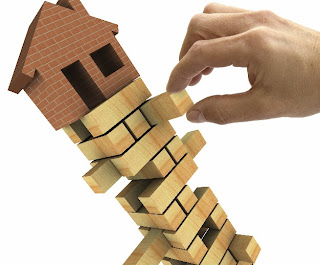Some experts are now saying that the Reserve Bank might be edging toward a rate cut in October. But its too early to tell from here
The other thing you have to question these days is "who said interest rates will fall in October and why they said it."
There are a lot of self interested groups out there spreading baseless rumours about everything these days, from job cuts, asylum seekers, interest rate cuts, the value of the Australian dollar, and about the Gillard Government Leadership. And for what purpose, other than sell gloom and negativity?
Well, apparently gloom and doom sells papers.
Is Australia's Right Wing Media trying to bring down an Elected Government?
This is a valid question. Its pretty obvious that many that work for Rupert Murdcoh seem to hate the fact that the Gillard Government is doing so well, and actually trying to make out that its not as good as it the numbers say. But the caravan rolls on, and things just keep on getting better for Australia. Despite their unfair and essentially untrue attacks.
Its gotten so bad, that I have refused to buy Newscorp's Australian newspapers anymore. Fairfax is still balance it its editorials in my view.
And the free community papers go straight in the bin.
So if you advertise with these right wing papers, you need to realise that people with non political views, or centre or left of centre views are being turned off your ads.
Its interesting that Newscorp profits fell last year.
Well I hope they keep on falling till they turn to losses that kill the papers that publish this spew, and pay these journos that produce it.
The RBA says enough is enough.
And its not just me that is seeing this bias and negativity by the Murdcoh papers.
The right wing media's relentless negativity is being drowned out in the Financial arena by a constant flow of comments by the RBA, who seems to be crushing a lot of the ring wing media's urban myths.
There used to be a time when you could read a paper, get the facts and make up your own minds. Now all you get is opinions and the facts are rarely given.
Gimme the facts, just the facts. Keep your opinions to yourself.
Today that idea of reporting the facts and letting people form their own opinions has all but gone.
Now the news giants peddle opinions.
Opinions that are best for them and their self interest in my view, not in the interest of teh public. So now we have the media supporting opinions biased towards one political party. Sure they can pull out any fact and statistic and make it sound that the Government is doing a lousey job and things would be so much better if Mr Abbott and the Coalition were in power.
But the fly in the ointment is that when the Coalition were in power, they had better conditions, but they performed worse by any standard, and lowered our services.
The RBA is telling people how it is, and it all good. Maybe too good.
Australians required confidence and composure from the crap that was coming from the right wing media.
This section is constantly talking down the economy and the achievements of the Labor Governments of Rudd and Gillard.
So the RBA Governor's hand was forced. He started to let people know how good things were travelling.
Did the right wing spruikers react? Boy did they? They started to slag the RBA Governor, started to say he should not be making public statements. Who says? They do. They were in charge of public opinion apparently.
Was the Government complaining? Of course not.
The comparisons are damning for the Liberals.
The liberals had the reins of the economy in the good times. The numbers are all sour for the Howard Government.
Employment, inflation, wages, productivity, and the value of the dollar were all worse under Howard. So why do the media think they are any good at running the Country? Believing their own spin? Wanting to believe?
Anyone can balance a budget by cutting spending in schools and hospitals and make companies more profitable in the short term by cutting wages. Anybody. There is no secret, No magic. But does that work long term? I believe not. design and innovation mean you get to the future first, and that is where the money is.
Industrial relations to the Liberals means lowering wages and conditions, and now sacking Public servants to balance to balance the books.
But if you want to build a competitive Nation that pays high wages, then that is a challenge.
Its means you have to get smarter, leaner and more innovative. All failures of the Liberals who's claim to fame is cost cutting and scaring the sh-t out of stupid people with regard to asylum seekers.
Australia is in a great position and we don't need lower wages and working conditions to make our way in the World.
We don't have to be mean and miserable to asylum seekers to protect our borders.
We need to take more Asylum seekers and have less failed States.
We need more of the Gillard Government.
For the second consecutive month we have seen declines in the jobless rate in August to just 5.14 per cent. That is during the barrage of gloom and doom spewing out of the Opposition and their media mates.
Can you imagine how good things will be if they media got behind the Government?
Where we need improvements.
The biggest room in the World is the room for improvement. We need improvements in the home construction industry, the building materials sectors and retailing needs a boost.
Both could be improved with an upswing in housing construction, as new homes means new needs to fit out and furnish those homes.
How we do that without causing land price inflation is the thing that the Gillard Government needs to work on next.
We have to learn to life with high wages and a high dollar value. That what success means to most.
Nobody in Australia wants Australians to have what the Greeks have.
The Australian Economy is far from Perfect. But in my view we have to give credit where credit is due. The gIllard Government continues to improve despite a hostile press.
If you advertise with News Ltd and you agree with this, Why not complain to the editor.
PS. I got a call from NewsPoll [I believe a NewsCorp Company 2 nights ago] The caller claimed he was "calling from NewsPoll, on behalf of the Government ". Since when does NewsPoll call and do surveys on behalf of the Government? Are they now telling outright lies?
Mr Mortgage

















